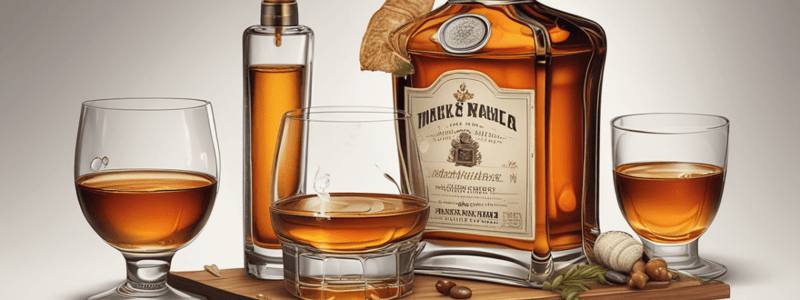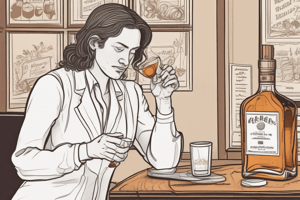Podcast
Questions and Answers
What is the primary reason our sense of taste is limited compared to our sense of smell?
What is the primary reason our sense of taste is limited compared to our sense of smell?
- Our tongue is less capable of detecting flavors.
- When we eat or drink, our tongue is more dominant than our nose.
- Our nose is more efficient at processing smells.
- Our sense of smell is more sensitive to aromatics. (correct)
According to Jean Anthelme Brillat-Savarin, what is the relationship between the sense of taste and smell?
According to Jean Anthelme Brillat-Savarin, what is the relationship between the sense of taste and smell?
- The sense of smell is a subset of the sense of taste.
- The sense of taste is more important than the sense of smell.
- The sense of taste is independent of the sense of smell.
- The sense of taste and smell form a single sense. (correct)
What is the role of alcohol in the experience of whiskey and other spirits?
What is the role of alcohol in the experience of whiskey and other spirits?
- It enhances the sense of taste but reduces the sense of smell.
- It acts as a solvent to bring aromas and flavors to the senses. (correct)
- It is a byproduct of fermentation with no impact on the senses.
- It is an irritant that masks the true flavors of the whiskey.
What is the similarity between whiskey and perfume?
What is the similarity between whiskey and perfume?
What is the result of the distillation process in whiskey production?
What is the result of the distillation process in whiskey production?
What is the role of barrel aging in whiskey production?
What is the role of barrel aging in whiskey production?
What is the unique aspect of the experience of whiskey and other spirits?
What is the unique aspect of the experience of whiskey and other spirits?
What is the quote from Jean Anthelme Brillat-Savarin that relates to the experience of whiskey and other spirits?
What is the quote from Jean Anthelme Brillat-Savarin that relates to the experience of whiskey and other spirits?
What is the primary effect of the heat of the mouth and hand on the whiskey?
What is the primary effect of the heat of the mouth and hand on the whiskey?
What is the result of the fermentation process in whiskey production?
What is the result of the fermentation process in whiskey production?
What is the primary reason why pure ethanol does not affect the taste buds?
What is the primary reason why pure ethanol does not affect the taste buds?
What is the result of overstimulating the polymodal pain receptors?
What is the result of overstimulating the polymodal pain receptors?
What is the main difference between satisfiers and maximizers?
What is the main difference between satisfiers and maximizers?
Why is high-end whiskey often rare whiskey?
Why is high-end whiskey often rare whiskey?
What is the 'angels share' process?
What is the 'angels share' process?
Why do older whiskeys tend to cost more?
Why do older whiskeys tend to cost more?
What is the typical characteristic of bourbon whiskey at 7 and 12 years old?
What is the typical characteristic of bourbon whiskey at 7 and 12 years old?
What is the main advantage of higher proof whiskey?
What is the main advantage of higher proof whiskey?
What is the main difference between cask strength whiskey and bottled-in-bond bourbon?
What is the main difference between cask strength whiskey and bottled-in-bond bourbon?
What is the term for the character of a distillery that can be bold and roaring or light and loving?
What is the term for the character of a distillery that can be bold and roaring or light and loving?
Which type of whiskey is often not available at higher proof?
Which type of whiskey is often not available at higher proof?
What do peat freaks use to compare peaty whiskeys?
What do peat freaks use to compare peaty whiskeys?
Why might phenols in malt not necessarily make it into the bottle?
Why might phenols in malt not necessarily make it into the bottle?
What did Lagavulin distillery manager George Crawford say about peat aficionados?
What did Lagavulin distillery manager George Crawford say about peat aficionados?
What is an advantage of craft whiskey?
What is an advantage of craft whiskey?
How many people work at the Glenlivet distillery?
How many people work at the Glenlivet distillery?
What benefit does craft whiskey gain from its association with craft brewing?
What benefit does craft whiskey gain from its association with craft brewing?
What is a key difference between craft brewing and craft whiskey?
What is a key difference between craft brewing and craft whiskey?
What is true about big distillers in the whiskey industry?
What is true about big distillers in the whiskey industry?
How many liters of whiskey did Glenlivet's distillers make in 2012?
How many liters of whiskey did Glenlivet's distillers make in 2012?
Flashcards are hidden until you start studying
Study Notes
The Challenging of Tasting Whiskey
- Our sense of taste is limited compared to our sense of smell, and when we eat or drink, we're not just tasting with our tongue, but also smelling as aromatics ride the airflow through our mouth and up into our nose.
- Whiskey and other spirits are more exciting because of the physical presence of alcohol, which is a powerful and volatile solvent that evaporates when it encounters the heat of our mouth and hand, carrying aromas and flavors to our senses.
- The creation of alcohol in fermentation brings aromas and flavors, while distillation filters and concentrates them, and barrel aging adds to the liquid, including the appealing color.
How We Perceive Whiskey
- Pure ethanol is odorless and tasteless and makes no impact on the taste buds; instead, it stimulates pain fibers in our nerve receptors, which can be overstimulated, leading to a sensation of burning.
- We can build up a tolerance to the physical heat and pain of the ethanol in whiskey, allowing us to perceive the flavors that were there all along.
No Easy Way Out
- There are no shortcuts to understanding whiskey, and no "best" whiskey; every whiskey is unique, and it's up to the individual to explore and find what they enjoy.
- High-end whiskey is often rare whiskey, and its price is influenced by factors like age, scarcity, and marketing.
- Young whiskey costs less because there's more of it, while older whiskey is more expensive due to the evaporation "angel's share" process.
Age and Proof
- Bourbons that are 15 years old and older are popular, with 7 and 12 years being a sweet spot where the whiskey has left behind its youthful green and fiery days but isn't dominated by the drying wood character of old age.
- Scotch blends command higher prices as they get older, and single malts climb steeply in price after 15 years of age.
- Distillery character can be bold or delicate, and aging too long in the wrong wood or a clumsily selected finish can enhance or detract from the whiskey's character.
- Higher proof is not necessarily better, as some whiskeys are not available at higher proof, and the idea that higher proof is better is often a myth.
Smokiness and Craft Whiskey
- Peat freaks love to compare peaty whiskeys, looking to ppm (parts per million) of phenols, the smoky compounds from peat smoke, as an objective measure, but phenols in malt don't necessarily mean they all get into the bottle.
- Craft or small maker whiskey is not necessarily better, as big distillers make great whiskeys that are clearly different, and the association with craft brewing doesn't necessarily translate to the whiskey industry.
Studying That Suits You
Use AI to generate personalized quizzes and flashcards to suit your learning preferences.



